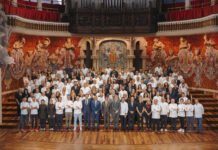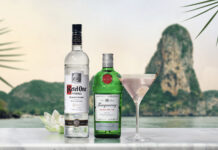The oldest recorded recipe for glass dates from the seventh century BCE, from the library of the Assyrian king Ashurbanipal. It reads, “Take sixty parts sand, a hundred and eighty parts ash from sea plants, five parts chalk, heat them all together, and you will get glass.” The most remarkable aspect of this text is how little of it has changed. A contemporary glass producer recently shared his recipe: 75% sand, 20% soda ash and lime, 5% modifiers. They may as well have been reading from a stone tablet.
The most important component of glass is common sand, which is effectively broken-down pieces of quartz. The scientific name for sand is silicon dioxide (SiO2), and it typically makes up two-thirds to three-quarters of the final blend. While it is possible to make glass from only sand (pure silicon crystal is used in the manufacture of superconductor chips, for example), it is more commonly cut. This is because SiO2 has a remarkably high melting point, and the amount of energy required to liquefy it is cost prohibitive.
Lime and soda ash are sand’s most common companions. Soda ash is more officially known as sodium carbonate and has the chemical composition Na2CO3. It was historically extracted from the ashes of plants grown in sodium-rich soil. Soda ash is essential, as it lowers the melting point of the silicon dioxide. It also plays the part of the cook and helps stir the soup! When heated, Na2CO3 breaks down to Na2O plus gaseous carbon dioxide. The CO2 bubbles percolate throughout the molten glass, thereby ensuring a homogeneous mix. If the furnace is too cool, the gas will not escape in time and bubbles can become frozen in the glass. This is commonly seen in antique glass, produced before sufficiently hot furnaces became commonplace during the 20th century.
Soda ash also has an adverse effect on glass, rendering it water soluble. The addition of lime (calcium oxide, or CaO) counteracts that tendency, and also serves to increase durability. These three ingredients combine to form what is known as soda-lime-silica glass, the foundation of the modern glass industry.
A range of other modifiers, generally metal oxides, are often included in small amounts. Their precise ratios will influence the final color and physical properties of the glass. Lead oxide is the most historically common addition; it increases the hardness of the glass, thereby rendering it more suitable for etching and carving. It also increases the refraction index—that is, it adds sparkle. Boron oxide is used in the baking goods industry to increase glass’s resistance to temperature changes, iron oxide can be used to increase heat absorption (it is used in movie projectors, for example), and other metal oxides can be used to add color.
The ingredients are then mixed together in a furnace and heated until they melt and combine, which is where things get interesting. In solid form, quartz has a dense atomic structure, with molecules of SiO2 stacked tightly on top of each other. This is common to crystals, and part of the reason many of them (quartz, diamond, ruby, etc.) are so hard. Once the melting temperature is achieved, the bonds between the molecules break down and the individual SiO2 molecules unstack and randomize, floating around in solution where they become interspersed with Na2O, CaO, and the other modifiers.


































